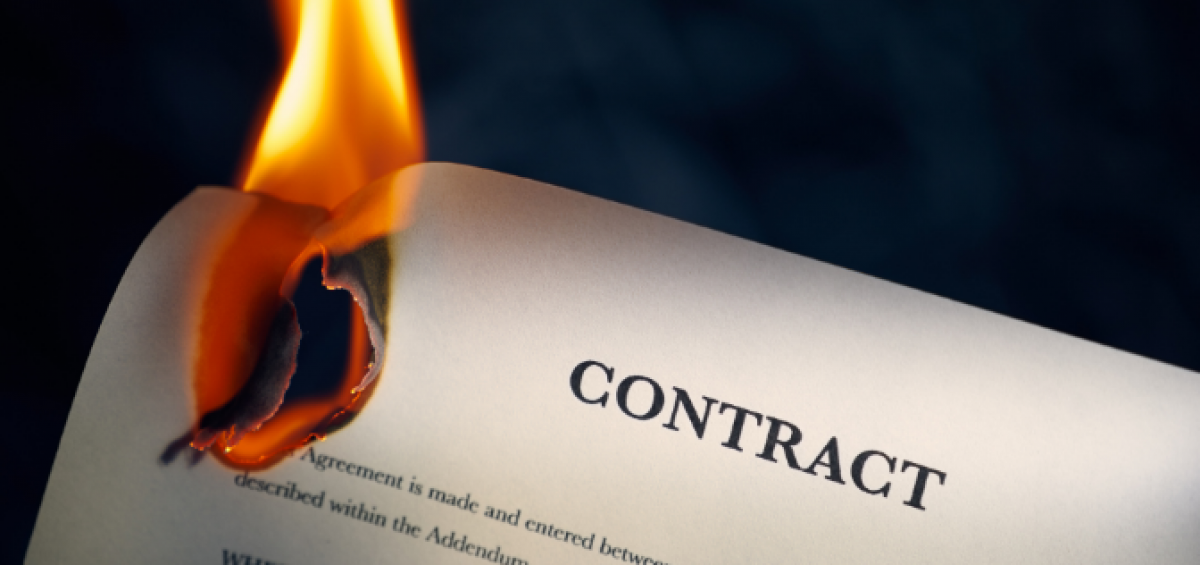From avoiding or enforcing large hotel contracts to multi-million dollar energy disputes, the law of force majeure has seen a major surge in the last year.
by Adam Schramek
Norton Rose Fulbright LLP
For many in Texas, the reality of the coronavirus pandemic started with the cancellation of South by Southwest (SXSW) in early March 2020. Over the next several months, every major convention, sporting event, business conference, festival and gathering of significant size was either cancelled or significantly revised (such as baseball games without fans). Then, about a year later, a blast of arctic air resulted in below-freezing temperatures, equipment failures and widespread losses of power in Texas as electricity generators struggled to meet demand. Multiple manufacturers and producers shut down or lost operations as a result of the winter storm, leading to supply chain disruptions and what is widely recognized as a public disaster.
These two events led to force majeure claims and disputes across the State and across the country. As a result, lawyers who had not considered force majeure law since the bar exam found themselves being asked to advise clients on these disputes. From avoiding or enforcing large hotel contracts to multi-million dollar energy disputes, the law of force majeure has seen a major surge in the last year. This article outlines the key force majeure issues and arguments Texas lawyers continue to face.[1]
I. Closely Analyze the Force Majeure Clause
There is no “standard” force majeure clause or universally accepted definition of “force majeure.” Rather, a force majeure is primarily a creature of contract and must be based on a specific contractual provision agreed-to by the parties. See, e.g., Sherwin Alumina L.P. v. AluChem, Inc., 512 F. Supp. 2d 957, 966 (S.D. Tex. 2007) (“While the theory of force majeure has been historically linked to impossibility of performance, the scope and application of a force majeure clause depends on the terms of the contract at issue.”); Tex. City Ref., Inc. v. Conoco, Inc., 767 S.W.2d 183, 186 (Tex. App.—Houston [14th Dist.] 1989, writ denied), (examining force majeure clause and noting that parties incorporated elements of a standard form used in the industry, but also “fashioned the contours of the force majeure on their own”); Belgium v. Mateo Productions, Inc., 138 A.D.3d 479, 482, 29 N.Y.S.3d 312, 315 (2016) (courts will not read beyond the language of the contract and the express language will dictate the application, effect and scope of the force majeure).
Just because a business may include force majeure clauses in all of its contracts does not mean they are necessarily all uniform. While a force majeure clause may be found in the “standard” terms and conditions of a contract, its remains subject to negotiation like any other term. The iterations of specific events of force majeure can vary widely, particularly between industries. And businesses allowing non-attorneys to negotiate agreements, particularly matters relating to special event space and hotel agreements, have been surprised at the terms of the clause they are facing.
II. Viruses and Snowstorms: Acts of God?
Force majeure clauses typically state that if performance of an obligation becomes “impossible by reason of” specifically-listed events of force majeure performance is relieved. See In re Cablevision Consumer Litig., 864 F. Supp. 2d 258, 264 (E.D.N.Y. 2012) (force majeure clauses “are construed narrowly and will generally only excuse a party’s nonperformance if the event that caused the party’s nonperformance is specifically identified”); c.f., Stinnes Interoil, Inc. v. Apex Oil Co., 604 F. Supp. 978, 980 (S.D.N.Y. 1985) (determining that adverse weather can be considered a force majeure event under a broad force majeure clause). The listed events can vary widely from contract to contract and from industry to industry. See, e.g., Mitsubishi Int’l Corp. v. Interstate Chem. Corp., No. 08 CIV.194 JSR, 2008 WL 2139137, at *3 (S.D.N.Y. May 20, 2008) (considering whether there was a practice in the chemical trading industry of excusing contract performance on the basis of events purported to constitute force majeure). Clauses sometimes list “storms” as qualifying events but rarely (at least prior to 2020) identify pandemics.
Many times, storms and pandemics are only potentially encompassed within an “Act of God” reference. However, because it is an undefined term, courts often incorporate a causal requirement into the definition. For example, some jurisdictions have opinions suggesting that acts of God may be limited to matters solely caused by forces of nature. See, e.g., McWilliams v. Masterson, 112 S.W.3d 314, 320 (Tex. App.—Amarillo 2003, pet. denied) (stating that an event may be considered an act of God when it is occasioned exclusively by the violence of nature); Tel Oil Co. Inc. v. City of Schenectady, 278 A.D.2d 571, 574, 718 N.Y.S.2d 410, 413 (2000) (stating that an act of God denotes only “those losses and injuries occasioned exclusively by natural causes” and “[i]f there be any cooperation of man, or any admixture of human beings, the injury is not in a legal sense, the act of God.”).
A definition of Act of God that incorporates sole causation is consistent with the “Act of God” defense available in tort claims. For example, the Texas Pattern Jury defines an Act of God as:
“An occurrence is caused by an act of God if it is caused directly and exclusively by the violence of nature, without human intervention or cause, and could not have been prevented by reasonable foresight or care.”
Texas Pattern Jury Charges—General Negligence & Intentional Personal Torts (emphasis added). Accordingly, an impacted business may argue that it was not the winter storm that precluded performance but its counter-party’s own negligence in failing to take reasonable steps to prepare for the storm and minimize its impact to its operations. See, e.g., Team Mktg. USA Corp. v. Power Pact, LLC, 41 A.D.3d 939, 942, 839 N.Y.S.2d 242, 246 (2007) (recognizing that purpose of force majeure is to relieve a party of liability when the parties’ expectations are frustrated due to an event that is “an extreme and unforeseeable occurrence,” that “was beyond [the party’s] control and without its fault or negligence.”); In re Old Carco LLC, 452 B.R. 100, 121 (Bankr. S.D.N.Y. 2011) (a party cannot rely on an excusing event if it “could have taken reasonable steps to prevent it”); see also Denis Binder, Act of God? Or Act of Man?: A Reappraisal of the Act of God Defense in Tort Law, 15 Review of Litig. 1, 64-65 (1996).
III. Provide Timely Notice of Force Majeure
Force majeure clauses often (but not always) have notification requirements. One of the first things a lawyer should consider when analyzing a potential force majeure dispute is whether notice was properly given. Indeed, a clause could require notice of an event of force majeure within a defined period (such as “within seven days of an event of force majeure”) or may only require notice “as soon as practicable.” Lawyers should carefully review notification requirements and, if asserting a force majeure event, try to strictly comply with them. Whether compliance with the notification requirement is a bar to asserting a force majeure defense is jurisdiction specific. Compare Vitol S.A., Inc. v. Koch Petroleum Group, LP, 01CV2184 (GBD), 2005 WL 2105592, at *11 (S.D.N.Y. Aug. 31, 2005) (“[T]he force majeure defense fails because defendant did not provide plaintiff with notification of the force majeure event as defendant was required to do under the parties’ contract.”) with Toyomenka Pac. Petroleum, Inc. v. Hess Oil Virgin Islands Corp., 771 F. Supp. 63, 67 (S.D.N.Y. 1991) (notice is not a condition precedent to invoking force majeure and lack of notice may be immaterial).
IV. Consider Whether the Effects of the Force Majeure Event Were Avoidable
Some force majeure clauses expressly incorporate an “avoidability” requirement as a carve-out to the force majeure clause. For example, one such clause states: “however, [force majeure] shall not mean or include any cause which by the exercise of due diligence the party claiming force majeure is able to overcome.” See Gulf Oil Corp. v. FERC, 706 F.2d 444, 448 n.8 (6th Cir. 1983); see also Tejas Power Corp. v. Amerada Hess Corp., 1999 WL 605550 *1, *3 (Tex. Ct. App. Aug. 12, 1999) (force majeure only includes causes “which, by the exercise of due diligence of such party, could not have been prevented or is unable to be overcome”). When avoidability is an issue, a party “must show that it tried to overcome the results . . . by doing everything within its control to prevent or to minimize the event’s occurrence and its effects.” See Gulf Oil Corp., 706 F.2d at 452; Constellation Energy Servs. of New York, Inc. v. New Water St. Corp., 146 A.D.3d 557, 559, 46 N.Y.S.3d 25, 27 (1st Dep’t 2017) (force majeure based on Hurricane Sandy was not an absolute defense where the party invoking force majeure could not establish that its failure to perform was the “unavoidable result of the storm”).
In McDevitt & Street Co. v. Marriott Corp., 713 F. Supp. 906 (E.D. Va. 1989), a contractor’s claim for extension of time was denied because he failed to take actions that could have prevented the weather damage. As the federal court explained:
“[W]hile [the contractor] does not control the weather, [the owner] has pointed to specific precautionary measures [the contractor] could have taken to minimize the adverse effects of precipitation. In some instances, these preventive or mitigating measures were contractually required. Yet [the contractor] chose not to take these actions. This failure to prevent or mitigate the effects undercuts its claim for excusable delay.”
Id. at 915.
In other words, while the weather was outside the control of the contractor, its effects on performance were not. While in McDevitt & Street Co., the mitigation requirement was in the contract, courts have applied the concept of unavoidability even when there was no contractual requirement to take any particular precaution. See, e.g., Domar Ocean Trans., Ltd. v. Indep. Refining Co., 783 F.2d 1185 (5th Cir. 1986).
Notably, while the Texas snowpocalypse was described by Texas Governor Greg Abbott as a once-in-a-century event “unprecedented in Texas history,” a party seeking to avoid a force majeure provision may argue that the effects of the storm were preventable, had proper precautions been taken. In February of 2011, for example, a winter storm triggered a deep freeze in Texas that caused coal and natural gas power plants to fail, generated price spikes that reached $3,000 per MWh, resulted in grid-wide rolling blackouts, and led several energy companies to declare force majeure for weather-related reasons. An August 2011 report prepared by the Federal Energy Regulatory Commission and the North American Electric Reliability Corporation recommended that operators take steps to weatherize their power generation facilities. See FERC/NERC Staff Report on Outages and Curtailments During the Southwest Cold Weather Event of February 1-5, 2011. Among the key findings of the report was that “[m]any generators failed to adequately apply and institutionalize knowledge and recommendations from previous severe winter weather events, especially as to winterization of generation and plant auxiliary equipment.” In addition, in January 2014, freezing winter weather in Texas forced several coal and natural gas units offline due to extreme cold, and resulted in rolling blackouts. Thus, a counterparty in an energy transaction may argue that the storm and its effects could have been guarded against had these recommendations been followed.
Similarly, while it will be harder to argue that the coronavirus global pandemic was foreseeable, the argument is not hopeless. The United States Intelligence Community, in its annual Worldwide Threat Assessment report of 2017 and 2018, said if a related coronavirus were “to acquire efficient human-to-human transmissibility”, it would have “pandemic potential.” See Worldwide Threat Assessment of the US Intelligence Community, Senate Select Committee on Intelligence, May 11, 2017. The 2018 Worldwide Threat Assessment also said new types of microbes that are “easily transmissible between humans” remain “a major threat.” See “U.S. intel agencies warned of a rising risk of an outbreak like coronavirus” (March 21, 2020), available at https://www.nbcnews.com/politics/national-security/u-s-intel-agencies-warned-rising-risk-outbreak-coronavirus-n1144891. Similarly, the 2019 Worldwide Threat Assessment warned that “the United States and the world will remain vulnerable to the next flu pandemic or large-scale outbreak of a contagious disease that could lead to massive rates of death and disability, severely affect the world economy, strain international resources, and increase calls on the United States for support.” See Worldwide Threat Assessment of the US Intelligence Community, Senate Select Committee on Intelligence, January 29, 2019.
V. Determine Whether Foreseeability is Required
Force majeure analysis is also impacted by the issue of foreseeability. Courts are split on whether an event must be “unforeseeable” in order to qualify as a force majeure. Some courts have required this additional showing regardless of whether the event was defined in the contract. See Gulf Oil Corp., 706 F.2d at 452; In re Cablevision Consumer Litig., 864 F. Supp. 2d at 264 (noting that force majeure clauses are aimed narrowly at unforeseeable events). However, other courts leave in place the allocation of risk negotiated by the parties regardless of whether an event is foreseeable. See Air Lines v. McDonnell Douglas Corp. , 532 F.2d 957 (5th Cir. 1976) (specifically enumerated force majeure events do not need to be unforeseeable); see also Jay D. Kelley, “So What’s Your Excuse? An Analysis of Force Majeure Claims,” 2 TEX. J. OIL GAS & ENERGY L. 91, 104 (2007).
That said, even when foreseeability is required, courts often recognize that the issue is the frequency of occurrence of the event. As one Texas court explained it:
“The specified events involve natural or man-made disasters (fires, floods, storms, act of God), governmental actions (governmental authority and war), and labor disputes. These events, while perhaps foreseeable, occur with such irregularity that planning for them and allocating the risks associated with such would be difficult absent a force majeure clause.”
TEC Olmos, LLC v. ConocoPhillips Co., 555 S.W.3d 176, 186 (Tex. App. 2018) (emphasis added). Other courts recognize the principle that even where the general nature of an event is foreseeable, the scope or severity of the event may not be. See, e.g., Phibro Energy, Inc., 720 F. Supp. at 320 (“[T]he fact that routine mechanical breakdowns were foreseen, does not necessarily mean major breakdowns were foreseeable.”). Thus, even if a party asserts that a major storm or global pandemic was foreseeable, one can argue that the severity of the storm or pandemic and the extent of damages were not.
VI. Final Thoughts
Lawyers should act now to assist their clients in updating their force majeure clauses based on the lessons learned over the last year. While a global pandemic or devastating snowstorm in Texas may or may not have been foreseeable in 2019, they are much more likely to be considered so in contracts negotiated in 2021. The law of force majeure continues to evolve, and disputes over contracts negotiated prior to 2020 will likely add to Texas jurisprudence over the next several years. ♦

Adam Schramek is a litigation partner in the Austin office of Norton Rose Fulbright. He handles complex litigation in state and federal courts across the country, and has extensive experience defending class actions, including class claims brought against insurance companies for coverage issues and claims adjustment practices. He also has significant experience with multidistrict litigation matters and arbitration proceedings.
Adam has litigated complex disputes for companies large and small. In recent years, his work has focused on the insurance, health care and manufacturing sectors. His broad-based litigation practice includes disputes involving trade secrets, software code and copyright claims, insurance coverage and commercial indemnities, bad faith and derivative liability, product defect, and professional negligence.
Adam handles matters on both sides of the docket, aggressively prosecuting and defending commercial claims across multiple jurisdictions. He chairs Norton Rose Fulbright’s US Pro Bono Committee, which focuses on increasing access to justice for persons of limited means, and is a director of the State Bar of Texas.
[1] Force Majeure opinions are relatively sparse in Texas. Because the basic principles of force majeure are similar under Texas and New York law and there are more reported decisions under the latter, this article cites cases from both jurisdictions.
Read More
White Whale, Black Swan
“Once men turned their thinking over to machines in the hope that this would set them free. But that only permitted other men with machines to enslave them… what the O.C. Bible should’ve said is: ‘Thou shalt not make a machine to counterfeit a human mind.” Frank Herbert, The Illustrated Dune (New York: Berkley Windhover, 1978), p. 12.
Retirement and the Texas Bar College
“Life moves pretty fast. If you don’t stop and look around once in a while, you could miss it.”
Ferris Bueller




